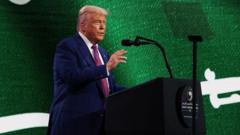In a striking speech delivered at an investment conference in Riyadh, President Trump declared the end of America’s long-standing policy of intervention and nation-building in the Middle East. He urged regional countries to take control of their destinies, denouncing historical American practices that many in the audience found relatable and celebratory. The reactions in the Middle East, from humor to hope, underscore a shared sentiment about the impact of past interventions.
Trump's Bold Shift in Middle Eastern Policy: “No More Lectures”

Trump's Bold Shift in Middle Eastern Policy: “No More Lectures”
In Riyadh, President Trump pledges no more Western interventionism during a significant investment conference.
During a grand investment event in Riyadh, President Donald Trump made headlines by asserting that the United States would cease its historically interventionist stance in the Middle East. “From now on, we’re not giving you lectures on how to live,” he proclaimed, receiving a warm reception from attendees. This statement marked a radical departure from decades of U.S. foreign policy characterized by attempts to impose Western ideals on the region.
Trump’s comments resonated deeply across a diverse audience, where longtime grievances about American military interventions in Iraq, Afghanistan, and ongoing support for Israel's actions in Gaza find consistent reflection in everyday discussions. “In the end, the so-called nation builders wrecked far more nations than they built,” Trump stated, echoing the frustrations common in local cafes where citizens have often felt marginalized by outside influences.
His remarks prompted reactions that spanned laughter and support; for instance, Saudi academic Sultan Alamer humorously compared Trump’s rhetoric to that of Frantz Fanon, a philosopher known for his critique of colonialism. Social media buzzed with supportive memes, particularly from Syrians celebrating the prospect of lifted sanctions that Trump hinted at, stating they deserved “a chance at greatness.” Similarly, Yemenis echoed a wish for sovereignty, reflecting a complex relationship with both the U.S. and their own governmental struggles.
As this pivotal address shifts perceptions, it remains to be seen how the region will respond to Trump’s call for self-determination, balancing hopefulness against a backdrop of political and humanitarian crises that have long plagued the Middle East.






















